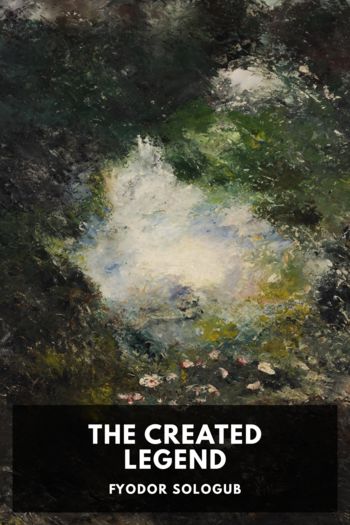The Created Legend - Fyodor Sologub (easy to read books for adults list TXT) 📗

- Author: Fyodor Sologub
Book online «The Created Legend - Fyodor Sologub (easy to read books for adults list TXT) 📗». Author Fyodor Sologub
The priest’s wife found herself an armchair in the dining-room, but she was not any more comfortable in it. Terrified in her armchair, she trembled like jelly. With pale lips she whispered to the parish-school girl she had won over to the cause:
“Irinushka, dearest, think of it—they are going to search us!”
The parish-school girl, Irinushka, looking slender, fresh, and red, like a newly washed carrot, moved her ears in her fright—a faculty which her companions envied her intensely—and whispered something to the priest’s wife.
The constable looked savagely at the priest’s wife and at the parish-school girl, and cried out in a shrill, somewhat hoarse voice, which resembled the crowing of a cock:
“I must very humbly ask you not to whisper.”
The constables with the guns pricked up their ears. Their sudden zeal made them perspire. The priest’s wife and the parish-school girl almost fainted from fright, but the girl at once recovered herself and began to get angry; she was now even more angry than she had been frightened a little while ago. Small tears gleamed in her eyes; small drops of perspiration appeared on her cheeks and on her forehead. The angry girl’s face grew even redder, so that now she resembled no longer a carrot but a wet beetroot. The only person in the room to be refreshingly and youthfully indignant, and all aflame with a deep anger, she looked truly beautiful in her ingenuous exasperation.
“Here is something new!” she cried. “Whispering is forbidden! Are you afraid that we will say something against you, that we will hurt you?”
At this moment all the Cadets and their wives and daughters, who were sitting around the table and against the walls, turned their horrified faces at the parish-school girl, and all together hissed at her. They would have laid hands on her, someone would have gagged her mouth—but not one of them dared to make a move. They sat motionless, looked at the parish-school girl with eyes dilated with fear, and hissed.
The parish-school girl, overcome with fright, grew silent. Only the hissing could be heard in the dining-room. Even the constables began to smile at the friendly hissing of the Cadets of both sexes.
When they had finished hissing, Irinushka said almost tranquilly:
“We didn’t whisper anything criminal. I only said about you, Mr. Constable, that you were fascinatingly handsome with your dark hair.”
When she saw that the Rameyev sisters were laughing, Irinushka turned to Elisaveta:
“You do agree with me, Vetochka, that the constable is a fascinatingly handsome man?”
The constable flushed. He was not sure whether the blushing girl was laughing at him or in earnest. In any case he frowned, vigorously twirled his dark moustache, and exclaimed:
“I must humbly ask you not to express yourself.”
Later, at home, Irinushka was scolded for her behaviour, regarded as untactful by Priest Zakrasin. The priest’s wife was especially angry. Poor Irinushka even cried several times.
But this was later. At this particular instant the Inspector of the police and the Colonel of the gendarmerie were sitting in Doctor Svetilovitch’s study and were examining the guests one by one; they turned their pockets inside out and, for some unknown reason, deprived their owners of letters, notes, and notebooks.
Rameyev was in a quiet, genial mood. He laughed on being searched. Trirodov made an effort to be calm and was a little sharper than he wished to be.
The women were searched in one of the bedrooms. A police-matron was brought for this purpose. She was a dirty, cunning sycophant. The contact of her coarse hands was repulsive. Elisaveta felt uncomfortably unclean after she had passed through the policewoman’s paws. Elena shivered with fear and nausea.
Those who had been searched were not permitted to enter the dining-room but were led into the drawing-room. Nearly all the searched ones were proud of this. They looked as if they were celebrating a birthday.
No one was arrested. They began to draw up the official report. Trirodov quietly addressed a gendarme, but the latter replied in a whisper:
“We are not permitted to enter into conversation with anyone. Those scoundrelly spies are watching us, so that we shouldn’t speak with liberals. They are quick to inform against us.”
“You are in an unfortunate business,” said Trirodov.
The Inspector of the police read the official report aloud. It was signed by Doctor Svetilovitch, the Inspector, and the witnesses.
When the uninvited guests left, the hosts and the invited guests sat down to supper.
It was presently discovered that the beer prepared for the occasion had been consumed. At the same time the cap of one of the guests had disappeared. Its owner was very much disturbed. The cap became almost the sole topic of conversation.
On the next day there was much talk in town about the search at the Svetilovitches, the consumed beer, and especially about the lost cap.
Not a little was said in the newspapers about the beer and the cap. One newspaper in St. Petersburg devoted a very heated article to the stolen cap. The author of the article made very broad generalizations. He asked:
“Is it not one of those caps with which we were preparing to throw back the foreign enemy? Is not all Russia seeking now its lost cap and cannot be consoled?”24
Much less was said and written about the consumed beer. For some reason or other it did not offend people so much. In accordance with our general custom of placing substance above the form, it was found that the stealing of the cap deserved the greater protest, inasmuch as it is more difficult to get along without a cap than without beer.





Comments (0)